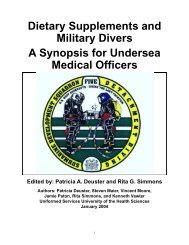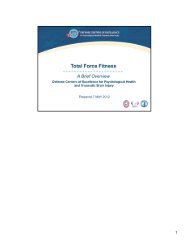Force Health Protection: Nutrition and Exercise Resource Manual
Force Health Protection: Nutrition and Exercise Resource Manual
Force Health Protection: Nutrition and Exercise Resource Manual
Create successful ePaper yourself
Turn your PDF publications into a flip-book with our unique Google optimized e-Paper software.
The body responds to cold by constricting (tightening) blood vessels to<br />
conserve heat <strong>and</strong> by shivering to generate heat <strong>and</strong> guard against<br />
hypothermia. There is increased urination <strong>and</strong> increased energy metabolism<br />
in cold environments, both on l<strong>and</strong> <strong>and</strong> in water.<br />
Energy Needs<br />
Many studies have shown that soldiers tend to progressively lose weight<br />
when conducting field exercises in the cold for two to three weeks. Because<br />
significant weight loss can result in fatigue <strong>and</strong> performance decrements,<br />
energy intake must increase to meet the increased energy dem<strong>and</strong>s. Energy<br />
requirements can increase by 25 to 50% because of the increased work<br />
associated with performing physical tasks in the cold <strong>and</strong> the kcal<br />
expenditure due to shivering. Factors that increase energy requirements in<br />
the cold include:<br />
◆ Increased basal metabolic rate (BMR, see page 3).<br />
◆ Shivering.<br />
◆ Working in cold weather gear.<br />
To meet energy needs consume a diet that is high in CHO (roughly 60%<br />
of your total daily kcals). This will replace glycogen stores (page 7) that are<br />
being used to maintain body temperature. Eat frequent high-CHO snacks to<br />
help meet your kcal requirements. Keep fat intakes under 30% of your total<br />
daily kcals since high-fat diets may cause stomach upset. Keep protein<br />
intakes at 10% of your total daily kcals <strong>and</strong> avoid protein <strong>and</strong> amino acid<br />
supplements because high-protein intakes increase water losses.<br />
Worksheet 12-2. Calculate Your Energy<br />
Requirements for a Cold Environment<br />
Your Estimated Energy Requirement (EER) =<br />
kcal/day.<br />
(from Worksheet 1-2)<br />
A 25% increase in energy requirements equals:<br />
EER x 0.25 =<br />
kcal/day.<br />
Your total energy requirement equals:<br />
EER + 25% increase= kcal/day.<br />
e.g., If your EER is 3,000 kcals/day then in a cold environment your energy needs would<br />
increase by 3,000 kcals x 0.25 = 750 kcals/day. Your total daily energy requirement would be<br />
3,000 kcals + 750 kcals = 3,750 kcals/day.<br />
96 <strong>Force</strong> <strong>Health</strong> <strong>Protection</strong>:




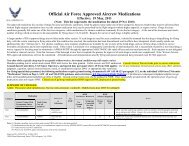

![Body Composition and Military [PDF] - Human Performance ...](https://img.yumpu.com/43269347/1/190x245/body-composition-and-military-pdf-human-performance-.jpg?quality=85)
![Tips for Grocery Shopping [PDF]](https://img.yumpu.com/37447379/1/190x245/tips-for-grocery-shopping-pdf.jpg?quality=85)
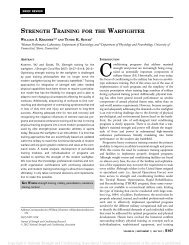
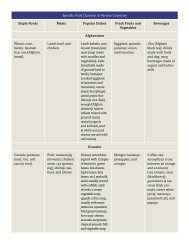
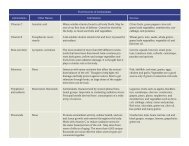
![Synthetic Drugs [PDF] - Human Performance Resource Center](https://img.yumpu.com/37447322/1/190x245/synthetic-drugs-pdf-human-performance-resource-center.jpg?quality=85)
